History of the Bosnia and Herzegovina national football team
| Nickname(s) |
Zmajevi (The Dragons) Zlatni ljiljani (The Golden Lilies) |
|---|---|
| Association | Football Association of Bosnia and Herzegovina (N/FSBiH) |
| Confederation | UEFA (Europe) |
| Most caps | Emir Spahić (89) |
| Top scorer | Edin Džeko (46) |
| Home stadium | Bilino Polje |
| FIFA ranking | |
| Highest | 13 (August 2013) |
| Lowest | 173 (September 1996) |
| First international | |
|
(Tirana, Albania; 30 November 1995)[1] | |
| World Cup | |
| Appearances | 1 (first in 2014) |
| Best result | Group Stage, 2014 |
The history of football in Bosnia and Herzegovina dates back to the early 1900s during the Austro-Hungarian rule.
The beginnings of the Bosnia and Herzegovina national football team itself date back to the team's formation and first ever international match in November 1995 days after the end of Bosnian War.
The team has qualified for one major tournament so far; a FIFA World Cup in 2014.
History
Pre-independence
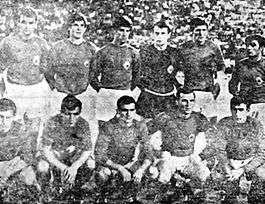
The game reached Bosnia and Herzegovina at the start of the 20th century, with Sarajevo (in 1903)[3] and Mostar (in 1905)[4] being the first cities to embrace it. Banja Luka, Tuzla, Zenica and Bihać were next along with numerous smaller towns as the sport began to spread.
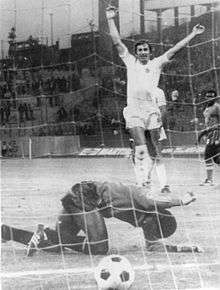
The country was under Austro-Hungarian rule when official competition began in 1908, though these activities were on a small scale within each territory.[6] At the outbreak of World War I, there were four clubs in Sarajevo; SAŠK, Slavija, Đerzelez (also known as Sarajevski),[7] and Makabi Sarajevo (also known as Barkohba),[8] with approximately 20 more outside the capital.
The creation of the Kingdom of Yugoslavia after 1918 brought an increase in the number of leagues, with a national championship being played since 1923. Until 1940 it featured three teams from Bosnia and Herzegovina: Sarajevo clubs SAŠK and Slavija and Krajišnik from Banja Luka. In 1920, the direct predecessor of the football organization of Bosnia-Herzegovina was founded as the Sarajevo football subassociation. The unified championship ran until the 1939–40 season, followed by the start of the Second World War.
The Football Association of Bosnia and Herzegovina was founded after the Second World War, being affiliated to the Yugoslav Football Association, then part of the newly founded SFR Yugoslavia.
Bosnia and Herzegovina's best sides at the time were Sarajevo, Željezničar (Sarajevo) and Velež (Mostar) which regularly played in the Yugoslav First League, second league and cup competitions with moderate success, while its best players with the likes of Safet Sušić, Vahid Halilhodžić, Faruk Hadžibegić, Ivica Osim, Blaž Slišković, Mehmed Baždarević, Dušan Bajević; who notably scored a hat-trick at 1974 FIFA World Cup, Josip Katalinski, Asim Ferhatović, and others were chosen to represent the Yugoslavia national football team.[9]
After the completion of UEFA Euro 1968, two players from SR Bosnia and Herzegovina, Mirsad Fazlagić and Ivica Osim, were chosen in the UEFA Team of the Tournament whilst representing the Yugoslav national team that ended up reaching the final of the tournament.
Origins
Shortly after Bosnia and Herzegovina's independence from Yugoslavia, at the outbreak of Bosnian War, a selection of Bosnia and Herzegovina players under the name "Bosnia-Herzegovina Humanitarian Stars" took part in humanitarian friendly matches away from home versus K.R.C. Genk and 1. FC Kaiserslautern during March 1993.[10] Blaž Slišković was the captain of this Bosnia and Herzegovina national side.[11][12] A few months later, Bosnia and Herzegovina football team (players assembled mainly from then FK Sarajevo) under manager Fuad Muzurović played their first match against another national team, and it took place in Tehran against Iran. Bosnia and Herzegovina won 3–1.[1][13] However the result was never registered as Bosnia and Herzegovina was not yet a member of FIFA.
"Congratulations on your victory. This is your way of fighting. This is the best way to present your young state to the world."
— Akbar Hashemi Rafsanjani, President of Iran on Bosnia and Herzegovina 3–1 friendly win over Iran on June 06, 1993.[1]
During the same period, on 22 July 1995, Bosnia and Herzegovina national team played another humanitarian match against Fortuna Düsseldorf, largely thanks to Aleksandar Ristić (Düsseldorf coach at the time) and Enver Marić (Düsseldorf goalkeeper coach) who were the most responsible for bringing the team to Germany at the time.[14] Haris Škoro scored a brace for Bosnia and Herzegovina at the game which finished 2–2.[15]
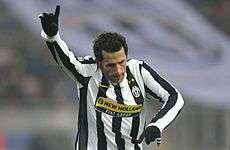
The team's first FIFA recognized friendly match, coming just nine days after the Dayton Peace Agreement brought an end to the Bosnian War, was played in Tirana against Albania on 30 November 1995. Then still a Republic of Bosnia and Herzegovina (as Dayton Agreement was formally signed on 14 December 1995 starting modern-day state of Bosnia and Herzegovina), the team was granted provisional FIFA membership to play this football game which Bosnia and Herzegovina lost 2–0. The team played in the shirts bought in neighbouring country's sports shops hours before the flight.[1][17] The starting eleven playing under head coach Fuad Muzurović at that friendly contest were: Ismir Pintol, Vedin Musić, Ibrahim Duro, Muhamed Konjić, Senad Begić, Nedžad Fazlagić, Esmir Džafić, Enes Demirović, Husref Musemić, Asim Hrnjić, and Almir Turković.
Bosnia and Herzegovina national football team was not eligible to take part in FIFA World Cup 1994 qualifiers as the country only became a member of FIFA in July 1996.[4] UEFA affiliation came in 1998 in Dublin and again the country missed out on taking part in UEFA Euro 1996 qualifiers.[4] In doing so Bosnia and Herzegovina became the only nation in the world in the modern times to first become a member of the World football organisation FIFA followed by becoming member of its continental organisation, UEFA.[18] The national team's first international victory as a FIFA member came against 1994 FIFA World Cup runners-up Italy on 6 November 1996.[19][20][21] The former Yugoslav country was ranked 170, while Italy were fifth at the time (a gap of 165 spots).[22]
Post-war years
Bosnia and Herzegovina's first qualifying attempt for any major tournament saw them grouped with Greece, Denmark, and two former Yugoslav republics Croatia and Slovenia during qualifiers for the 1998 FIFA World Cup. On 1 September 1996, captained by Mehmed Baždarević, Bosnia and Herzegovina made their UEFA debut going down 3–0 versus Greece in their first ever official major tournament qualifying match.[23] Bosnia and Herzegovina finished the group in fourth position, having beaten Slovenia twice, and beating Denmark 3–0 at home. Fuad Muzurović led the team at its first qualifying campaign.[24] In the eventual tournament, Denmark reached Quarter-finals stage while Croatia took bronze.
| Team | Pld | W | D | L | GF | GA | GD | Pts |
|---|---|---|---|---|---|---|---|---|
| | 10 | 0 | 0 | 26 | 5 | +21 | 30 | |||||||
| | 5 | 3 | 2 | 15 | 10 | +5 | 18 | |||||||
| | 3 | 2 | 5 | 14 | 17 | −3 | 11 | |||||||
| | 3 | 2 | 5 | 8 | 16 | −8 | 11 | |||||||
| | 3 | 2 | 5 | 15 | 17 | −2 | 11 | |||||||
| | 0 | 3 | 7 | 4 | 17 | −13 | 3 |
Mišo Smajlović's Bosnia and Herzegovina side only managed to win 3 games from 10 played in the UEFA Euro 2000 qualifying campaign. The results were two losses against the Czech Republic, two losses against Scotland, a win and a draw against the Faroe Islands and Estonia respectively and a win and a loss against Lithuania. The team finished in third place level on points with Lithuania and Estonia but with a better head-to-head record.
On 25 April 2000, Bosnia and Herzegovina played a humanitarian game for Bosnian and Herzegovinian orphans against FIFA's World Stars XI in front of 25,000 people at the Koševo Stadium in Sarajevo.[25] The game finished 0–1 in favour of the Stars through a Roberto Baggio penalty. Dunga and Ali Daei also made appearances for the World XI.

In the World Cup 2002 qualifying round, the Bosnians and Herzegovinians continued the bad form and finished in fourth place, behind Spain, Austria and Israel having only beaten Liechtenstein both home and away. After this campaign Blaž Slišković was named to replace coach Mišo Smajlović.
Despite poor start, Bosnia had a chance to top their Euro 2004 qualifying group with a victory on the last match-day. Blaž Slišković's men started the qualifying campaign with two losses, home to Romania and away to Norway in Oslo. The following year, team beat Luxembourg and came out with a 2–0 win versus Denmark in Copenhagen. Romania however proved too strong once again for the Bosnians and Herzegovinians, scoring once in each half to prevail in Craiova. In September 2003 Bosnia and Herzegovina, thanks to Zlatan Bajramović's 87th-minute strike, beat Norwegians in Zenica. This followed with a victory over Luxembourg. Bosnia and Herzegovina climbed to third on the table with 12 points, and had a chance to top the group with a win over Denmark in Sarajevo. However, the game finished in a heartbreaking 1–1 home draw for the home side who had to settle for a fourth-place finish instead.[26]
| Team | Pld | W | D | L | GF | GA | GD | Pts |
|---|---|---|---|---|---|---|---|---|
| 10 | 6 | 4 | 0 | 16 | 1 | +15 | 22 | |
| 10 | 5 | 5 | 0 | 19 | 3 | +16 | 20 | |
| 10 | 4 | 4 | 2 | 12 | 9 | +3 | 16 | |
| 10 | 3 | 3 | 4 | 16 | 11 | +5 | 12 | |
| 10 | 2 | 4 | 4 | 8 | 9 | −1 | 10 | |
| 10 | 0 | 0 | 10 | 2 | 40 | −38 | 0 |
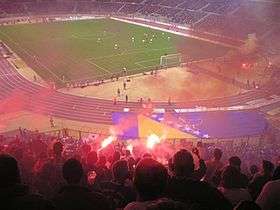
In the World Cup 2006 qualifying round, the Bosnians and Herzegovinians played Spain, drawing twice, Belgium (one win, one loss), Serbia and Montenegro (one draw, one loss), San Marino (two wins), but spilled crucial points at home against Lithuania playing only 1–1 (having won away). Against Serbia and Montenegro, Bosnia and Herzegovina drew at home but lost the second leg in Belgrade with a score 1–0. Bosnia and Herzegovina was hoping to finish in at least second position with an away win over their neighbours and hoping Spain to lose. Against Spain, Bosnia and Herzegovina led 1–0 for most of the match thanks to Zvjezdan Misimović's goal in the 39th minute but the game ended in draw when Carlos Marchena of Spain scored to level the game in the 96th minute at the Estadio Mestalla in Valencia, and after Bosnia had two players sent off. The match finished 1–1.[27] Bosnia and Herzegovina finished third, and undefeated at home, in their World Cup 2006 qualifying group four points behind second placed Spain and four points in front of fourth placed Belgium.
Transition years
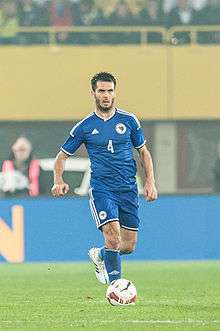
2008 UEFA European Football Championship qualifying campaign began with a 5–2 victory over Malta away. However, losses to Hungary and Greece at home, and a draw with Moldova in Chisinau led to Fuad Muzurović appointed as interim coach following the departure of Blaž Slišković. In addition to this change, 13 first team players refused to play for the national team, calling for four key Bosnia and Herzegovina Football Association officials at the time – Milan Jelić, Iljo Dominković, Sulejman Čolaković, and Ahmet Pašalić – to resign.[29]
Edin Džeko, Vedad Ibišević, Sejad Salihović, Senijad Ibričić and Boris Pandža who played in the 2007 UEFA European Under-21 play-offs vs Czech Republic, commenced their senior careers at this point as a result of the recent changes within the squad.
Soon after Bosnia and Herzegovina beat Norway 2–1 in Oslo. In August 2007, the national team played a friendly match in Sarajevo against Croatia. Losing 3–5, with Zlatan Muslimović scoring a hat trick for Bosnia and Herzegovina.
After the game against Norway, Bosnia and Herzegovina continued with two further wins at home, a 3–2 victory against Turkey and a marginal victory against Malta. Edin Džeko and Elvir Rahimić made debut appearances for the Bosnia and Herzegovina against Turkey in Sarajevo. After these two games, two defeats at home to Hungary and Moldova followed. Bosnia and Herzegovina then suffered further defeats against Greece, Norway and Turkey, finishing their qualifiers in the fourth position. Following yet another failed campaign Meho Kodro was named as a replacement coach for Fuad Muzurović, however Meho Kodro was quickly dismissed after only a few months in charge.[30]
2010 FIFA World Cup – play-offs
|
Bosnia and Herzegovina football association announced Miroslav Blažević as the new manager for the World Cup 2010 qualifiers. In October 2009, the team qualified for the UEFA Second round in the 2010 FIFA World Cup qualification finishing second with a game to spare in a group won by then European champions Spain.[31] Edin Džeko was the top scorer of the group, and achieved equal second place overall in the Europe section with 9 goals. Bosnia and Herzegovina played Portugal losing both games by single goal. Along the standard qualification process the team beat Belgium, Estonia and Armenia at both home and away, and drew one game with Turkey. Haris Medunjanin, Miralem Pjanić and Asmir Begović made their first appearances for the national side during these qualifiers.
Portugal won 2–0 on aggregate and qualified for the 2010 FIFA World Cup.
In the eventual tournament, Portugal went out in round of 16 stage of 2010 FIFA World Cup to the eventual champion Spain.
Safet Sušić period (2010–2014)
UEFA Euro 2012 – play-offs
|

The national team coached by Safet Sušić reached their second consecutive play-off berth during qualification for the UEFA Euro 2012 as they were unable to beat France national football team in Paris to qualify directly. The Bosnians and Herzegovinians had to win the game to top Group D and qualify for the tournament. Edin Džeko scored and they led 0–1 until the 77th minute when Scottish referee Craig Thomson awarded a penalty to France. The French leveled the game which meant that Bosnia and Herzegovina finished second, one point behind France.
Bosnia and Herzegovina was drawn to play Portugal, who were the eighth-ranked team in the world at the time, for the second play-off in a row.[34][35] After a scoreless first leg, qualification would be decided in Portugal. Cristiano Ronaldo (two goals) and Nani both scored as Portugal went on to record a 6–2 win. Bosnia and Herzegovina went 2–0 down after 25 minutes. Zvjezdan Misimović scored in the 41st minute to reduce the score to 2–1 from a penalty kick before Cristiano Ronaldo again restored a two-goal advantage after the interval. At this point, Bosnia and Herzegovina were reduced to ten men as Senad Lulić received two yellow cards in less than a minute; In the 65th minute, Bosnia and Herzegovina captain Emir Spahić, reduced the deficit to one goal once again, knowing that a score draw was all that was required for Bosnia and Herzegovina to qualify for UEFA Euro 2012. However, Bosnia and Herzegovina lost 6–2 on the day, and on aggregate.[36][37]
Portugal won 6–2 on aggregate and qualified for UEFA Euro 2012.
In the eventual tournament, Portugal went out in semi-final stage of Euro 2012 on penalties to the eventual champion Spain.
2014 FIFA World Cup – finals debut

|
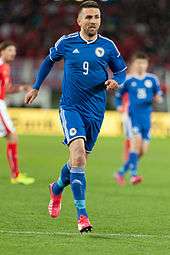
During the qualifying stage, Bosnia and Herzegovina managed by Safet Sušić, were drawn to face Greece, Slovakia (both of whom took part in 2010 FIFA World Cup), Lithuania, Latvia and Liechtenstein in Group G. The national side started the qualifiers with a 1–8 away victory over minnows Liechtenstein, recording the side's equal largest victory to date. The team continued the high goalscoring run, beating Latvia 4–1 and Lithuania 3–0, both at home, as well as holding out Greece to a 0–0 draw in Piraeus.[39] Due to an injury, Miralem Pjanić missed out on a crucial qualifier reverse leg against Greece on 22 March 2013 which Bosnians won 3–1 with Edin Džeko scoring twice.[40] This followed with a 5–0 win against Latvia in Riga.
A 0–1 loss to Slovakia on 6 September 2013 at home in Zenica allowed Greece to come level on points, however Bosnia and Herzegovina maintained its advantage (goal difference) with a hard-fought 2–1 win over Slovakia in Žilina four days later. Izet Hajrović, in only his second cap, scored a stunning 25m-strike with his very first contact with the ball (after coming on as a sub) to win it for the Bosnians.[41] Bosnia and Herzegovina qualified for the World Cup for the first time in their history following a home 4–1 victory over Liechtenstein and a 1–0 away victory against Lithuania in Kaunas on 15 October 2013 with the lone strike coming courtesy of Vedad Ibišević.[42][43] The national team finished level on 25 points with Greece, but their superior goal difference earned the top spot and an automatic place in the 2014 FIFA World Cup in Brazil.[44] Edin Džeko with ten goals and Vedad Ibišević with eight goals scored, made for one of the most lethal partnerships in front of opposition goal during the European qualification phase.
Bosnia headed into the finals tournament with confidence boosting friendly wins over both Mexico and Ivory Coast[45] where they played with the lone centre forward in Edin Džeko and defensive midfielder in Muhamed Bešić, a 4–2–3–1 formation that Bosnia would take into World Cup due to concerns over the strength of opposition.[46]
Drawn to face two time World Cup champions Argentina on 15 June 2014 at the famous Estádio do Maracanã in Rio de Janeiro for their first ever World Cup game, team also faced 2013 Africa Cup of Nations champions Nigeria, and Iran in Group F.
"Congratulations to Bosnia. With all due respect to Nigeria and Argentina, the best team in the group (Bosnia) didn’t qualify."
— Iran national football team manager Carlos Queiroz on 25 June 2014.[47]
| Team | Pld | W | D | L | GF | GA | GD | Pts |
|---|---|---|---|---|---|---|---|---|
| 3 | 3 | 0 | 0 | 6 | 3 | +3 | 9 | |
| 3 | 1 | 1 | 1 | 3 | 3 | 0 | 4 | |
| 3 | 1 | 0 | 2 | 4 | 4 | 0 | 3 | |
| 3 | 0 | 1 | 2 | 1 | 4 | −3 | 1 |

Bosnia and Herzegovina conceded three minutes into their World Cup debut against Argentina with a Sead Kolašinac own goal. In the 65th minute, Messi increased the Argentine lead scoring from the edge of the penalty area before Vedad Ibišević scored Bosnia's first ever World Cup goal for a final result of 1–2.[48] On 21 June, at the Arena Pantanal in Cuiabá, Bosnia and Herzegovina played against Nigeria. Peter Odemwingie scored the only goal of the game, however during the first half Edin Džeko had a goal incorrectly disallowed for being offside by the assistant referee.[49][50] The call was wrong by more than two meters which sparked controversy outcries from the Bosnian fans, especially after the circulation of a photo catching the match referee Peter O'Leary celebrating with the Nigerian goalkeeper for the match Vincent Enyeama.[51][52] During the second half stoppage time Džeko was also unfortunate to have had his close range shot deflected onto the post by Nigerian goalkeeper.[53] On 9 November 2014, Peter O’Leary, the game referee speaking to New Zealand Herald newspaper admitted Džeko's goal was disallowed in error.[54]

On 25 June, Bosnia-Herzegovina recorded its first World Cup victory, beating Iran 3–1, with the goals scored by Edin Džeko, Miralem Pjanić and Avdija Vršajević. Due to Bosnia's early elimination from the tournament, coach Safet Sušić experimented with the starting XI for this game, returning to a two-man front line that featured throughout qualifiers, and giving young players (who took no part in qualifiers) World Cup game time with the likes of Anel Hadžić (3rd cap), Tino-Sven Sušić (4th cap), Sead Kolašinac (6th cap) and Muhamed Bešić (12th cap). Bosnia finished the tournament in Group stage placed third, with three points from three matches played.[56]
Bosnia were drawn to face Belgium, Israel, Wales, Cyprus and Andorra in UEFA Euro 2016 qualifying Group B.
Bosnia started the qualifiers with a shock 1–2 home loss to lowly Cyprus (ranked 121 places behind Bosnia in FIFA Ranking at the time).[nb 1] This followed with two draws, 0–0 with Wales in Cardiff, and 1–1 in Zenica vs Belgium. With both Edin Džeko and Vedad Ibišević out of their next game due to injuries, Bosnia were defeated by Israel in Haifa 0–3.[58]
On 17 November 2014, Safet Sušić was sacked as manager of Bosnia due to a run of poor results, collecting just two points from four matches, in UEFA Euro 2016 qualifying.[59][60][61] Bosnia was 7 points behind first placed Israel, who also played one game less.
Mehmed Baždarević period (2015– )
UEFA Euro 2016 – play-offs
| Pos | Team | Pld | W | D | L | GF | GA | GD | Pts | Qualification |
|---|---|---|---|---|---|---|---|---|---|---|
| 1 | |
10 | 7 | 2 | 1 | 24 | 5 | +19 | 23 | Qualify for final tournament |
| 2 | |
10 | 6 | 3 | 1 | 11 | 4 | +7 | 21 | |
| 3 | |
10 | 5 | 2 | 3 | 17 | 12 | +5 | 17 | Advance to play-offs |
| 4 | |
10 | 4 | 1 | 5 | 16 | 14 | +2 | 13 | |
| 5 | |
10 | 4 | 0 | 6 | 16 | 17 | −1 | 12 | |
| 6 | |
10 | 0 | 0 | 10 | 4 | 36 | −32 | 0 |
On 13 December 2014,[62] Mehmed Baždarević was named the new manager of the Bosnia and Herzegovina national football team,[63][64][65] and on 28 March 2015, debuted with a 3–0 victory over Andorra.[66] Bosnia then continued its' revival under Bazdarevic and beat Israel 3–1 in Zenica, with Edin Višća scoring his first goals for the national team.[67] Bosnia lost their next game 3–1 to Belgium.[68] This was followed by a routine 3–0 victory over Andorra, placing the Bosnians back within reach of the 3rd place playoff spot.[69] Bosnia's next match in Zenica was against Wales, who were sitting atop the qualifying group. Bosnia was without key players Džeko, Bešić, and Kolašinac for the final two group stage matches. Bosnia and Herzegovina secured a playoff spot with victories over both Wales, 2–0 in Zenica, and Cyprus, 3–2 in Nicosia where Milan Đurić scored the decisive winner.[70][71]
Bosnia were the highest seeded team coming into play-offs and drew to face Republic of Ireland, who finished behind Germany and Poland and ahead of Scotland in their qualifying group. Ireland's Walters and O'Shea were suspended for the first leg, as was Bešić for Bosnia, with Given and Long also ruled out injured for the Irish while Bosnia was near full strength. The Bosnians could not make the home advantage count as the fog-affected[72] first leg finished in 1–1 draw. Regular starters Šunjić and Mujdža could not take part in second leg for Bosnia-Herzegovina due to injuries sustained in the first leg. Jonathan Walters, back for Ireland for the return leg, struck twice from set play in a packed Aviva Stadium, taking his side to UEFA Euro 2016 with a 3–1 aggregate win. Ibišević failed to reduce the deficit in injury time as his volley shot hit the crossbar.[73][74] Bosnia and Herzegovina along with the Netherlands and Greece were the only nations from Pot 1 not to qualify for the finals. All three took part at the 2014 FIFA World Cup.
Republic of Ireland won 3–1 on aggregate and qualified for UEFA Euro 2016.
At the finals, Republic of Ireland reached the round of 16 losing 1–2 to host nation France after being ahead 1–0 at half time; while Wales and Belgium famously faced each other in the quarter-finals stage of UEFA Euro 2016.
2016 Kirin Cup – champions
History was made for Baždarević's Bosnia-Herzegovina when the team won the 2016 edition of the Kirin Cup, beating Denmark and Japan along the way. Bosnia traveled to Japan without its most capped players in Roma duo Edin Džeko and Miralem Pjanić as well as Chelsea goalkeeper Asmir Begović and veteran defender Emir Spahić; giving opportunity to less experienced players to make their mark. In the first semi final, Milan Đurić scored a second half brace vs Denmark to draw the game level at full time, before Bosnia defeated Denmark on penalties in its' first ever penalty shootout.[75] In the final, Bosnia met host nation Japan, who outclassed Bulgaria in the other semi final 7–2. Đurić struck twice yet again to seal a historic 2–1 win at Suita City Football Stadium in Osaka, giving the Bosnia-Herzegovina national football team its' first ever international trophy.[76]
After the tournament, Đurić was nicknamed Bosnian Samurai by the Bosnian media due to his hair style and for being the tournament's top scorer and best player.[77][78]
Notes
- ↑ August 2014 FIFA World Rankings.[57]
References
- 1 2 3 4 Jonathan Wilson (1 May 2014). "Despite its inescapable past, Bosnia-Herzegovina writes new chapter". sportsillustrated.cnn.com.
- ↑ "Italy v Yugoslavia EURO 1968 Final Rome" (PDF). Iskra Sport. 30 July 2015. Retrieved 30 July 2015.
- ↑ radiosarajevo.ba (12 August 2014). "Znate li kad je fudbalska lopta donešena u Sarajevo?". radiosarajevo.ba (in Bosnian). Retrieved 12 August 2010.
- 1 2 3 Uefa.com (21 February 2010). "Bosnian standards continue to rise". UEFA. Retrieved 21 February 2010.
- ↑ "Josip Katalinski at World Cup 1974 against Zaire". German Federal Archive. 30 July 2015. Retrieved 30 July 2015.
- ↑ nfsbih.ba (1 January 2010). "Hronologija Razvoja Saveza". nfsbih.ba (in Bosnian). Retrieved 1 January 2010.
- ↑ fsks.ba (16 August 2011). "Fudbal u Sarajevu". fsks.ba (in Bosnian). Retrieved 16 August 2011.
- ↑ rsssf.com (12 August 2014). "Regional Leagues 1938/39 Sarajevski Podsavez". rsssf.com. Retrieved 12 August 2014.
- ↑ H. Ljevo (11 December 2013). "From Brazil to Brazil in 64 years". sportsport.ba. Retrieved 11 December 2013.
- ↑ Australautern (22 August 2009). "Betze Legends 1992: 1.FC Kaiserslautern vs. Bosnia Herzegovina". YouTube. Retrieved 22 August 2005.
- ↑ Edin Isanović (31 May 2009). "Prve utakmice bh. reprezentacije". sarajevo-x.com (in Bosnian). Retrieved 31 May 2009.
- ↑ Edin Isanović (9 March 2009). "Sušić, Slišković, Škoro i drugi počeli stvaranje reprezentacije". Sarajevo-x.com (in Bosnian). Retrieved 9 March 2009.
- ↑ eloratings.net (11 October 2011). "World Football Elo Ratings: Bosnia and Herzegovina". eloratings.net. Retrieved 11 October 2011.
- ↑ Sportske Legende TV (23 March 2011). "Muzurović talks about Bosnian beginnings min 32:45". StudioFITO (in Bosnian). Retrieved 6 October 2012.
- ↑ bihsoccer.com (13 February 2006). "Fortuna Dusseldorf – Bosnia-Herzegovina 2:2". bihsoccer.com (in Bosnian). Retrieved 6 October 2012.
- ↑ "BiH – Croatia 1:4". N/FSBiH. 29 May 2015.
- ↑ theguardian.com (6 December 2013). "Bosnia and Herzegovina unite behind their World Cup-bound football heroes". theguardian.com. Retrieved 6 December 2013.
- ↑ nfsbih (1 January 2010). "Hronologija Razvoja Saveza". nfsbih.net (in Bosnian). Retrieved 1 January 2010.
- ↑ independent.co.uk (11 November 1996). "Football; Bosnia finally put on the map". The Independent. London.
- ↑ Bosnia and Herzegovina national football team results#1996
- ↑ nfsbih.net (6 November 1996). "Bosnian first victory" (in Bosnian).
- ↑ theguardian.com (26 November 2014). "Has a team ever scored twice without the opposition touching the ball?".
- ↑ Fuad Krvavac (12 October 2012). "Prije 16 godina BiH je igrala sa Grčkom u Kalamati". klix.ba (in Bosnian). Retrieved 12 October 2012.
- ↑ Al Jazeera Balkans (15 June 2014). "Naša brazilska priča (Our Brazil Story)". Sabahudin Topalbećirević (in Bosnian). Retrieved 18 June 2014.
- ↑ pro-paul.net (26 April 2000). "FIFA World Stars XI beat Bosnia". pro-paul.net. Retrieved 26 April 2000. Check date values in:
|access-date=(help) - ↑ Uefa.com (12 October 2003). "Denmark do just enough". UEFA. Retrieved 12 October 2003.
- ↑ uefa (8 June 2005). "Spain – Bosnia-Herzegovina Match Report WC Q 2006".
- ↑ "FIFA.com: Emir SPAHIC Profile". fifa.com. 15 June 2014. Retrieved 17 June 2014.
- ↑ "Reprezentativci BiH neće igrati dok ne odu Jelić, Dominković, Čolaković i Pašalić" (in Bosnian). Sarajevo-X. 31 October 2006. Retrieved 31 August 2010.
- ↑ uefa (17 May 2008). "Kodro fired as Bosnia-Herzegovina boss".
- ↑ "Jubilant Bosnians book play-off place". UEFA. 10 October 2009. Retrieved 10 October 2009.
- ↑ "FIFA.com: Edin DZEKO Profile". fifa.com. 15 June 2014. Retrieved 17 June 2014.
- ↑ markbooth_mcfc (21 August 2014). "Dzeko signs four-year deal at City". mcfc.co.uk. Manchester. Retrieved 21 August 2014.
- ↑ UEFA.com (13 October 2011). "Draw for the UEFA EURO 2012 play-offs".
- ↑ Piotr Kozminski (13 October 2011). "Sušić and Bento expect to be pushed all the way".
- ↑ uefa.com (15 November 2011). "Portugal overwhelm ten-man Bosnia and Herzegovina". uefa.com. Retrieved 15 November 2011.
- ↑ telegraph.co.uk (16 November 2011). "Cristiano Ronaldo and Nani lead Portugal to 6–2 demolition of Bosnia-Herzegovina and Euro 2012 finals". telegraph.co.uk. London. Retrieved 16 November 2011.
- ↑ "World Cup 2014: Argentina 2–1 Bosnia highlights". BBC Sport. 16 June 2014. Retrieved 16 June 2014.
- ↑ fifa.com (16 October 2012). "First-half flurry sees Bosnia-Herzegovina cruise". fifa.com. Retrieved 16 October 2012.
- ↑ fifa.com (22 March 2013). "Dzeko double sees off Greece". fifa.com. Retrieved 22 March 2013.
- ↑ "Južna Amerika na bosanski način" (in Bosnian). mozzartsport.com. 10 September 2013. Retrieved 3 December 2013.
- ↑ "From the battlefield to football field: 20 years on from the Balkans bloodshed, Bosnia and Herzegovina are ready to rival world's top teams in Brazil". Daily Mail. London. 15 October 2013. Retrieved 16 October 2013.
- ↑ "Bosnia-Herzegovina's Debut In World Cup – A Victory For Football". thehardtackle.com. 2 July 2014. Retrieved 2 July 2014.
- ↑ "Bosnia-herzegovina qualifies for first world cup". Goal.com. 15 October 2013. Retrieved 16 October 2013.
- ↑ "Iran Can Be a Crossroads for the Future of Bosnian Football". bleacherreport.com. 24 June 2014. Retrieved 24 June 2014.
- ↑ Albinko Hasic (18 June 2014). "Lionel Messi's 'Shadow' Becomes Bosnia's Key Player and an Internet Sensation". bleacherreport.com. Retrieved 18 June 2014.
- ↑ "World Cup 2014: Bosnia and Iran rue first round exits". theaustralian.com.au. 26 June 2014.
- ↑ "Argentina 2 Bosnia and Herzegovina 1". BBC Sport. 15 June 2014.
- ↑ Chris Greenberg (21 June 2014). "Bosnia-Herzegovina Robbed Of Goal By Offside Call In Loss To Nigeria, Eliminated At World Cup". huffingtonpost.com. Retrieved 21 June 2014.
- ↑ Joe Bernstein (25 June 2014). "Nigeria 1–0 Bosnia-Herzegovina: Peter Odemwingie scores only goal as Edin Dzeko and Co crash out of World Cup". dailymail.co.uk.
- ↑ Oscroft, Tim (21 June 2014). "Nigeria 1–0 Bosnia". BBC Sport. Retrieved 22 June 2014.
- ↑ Peter Staunton (22 June 2014). "Dzeko: 'Shameful' referee should be sent home after Bosnia-Herzegovina loss". goal.com. Retrieved 22 June 2014.
- ↑ "Nigeria 1 Bosnia and Herzegovina 0". BBC Sport. 21 June 2014.
- ↑ Matthew Theunissen (9 November 2014). "Death threat ref's international return". nzherald.co.nz. Retrieved 9 November 2014.
- ↑ "Match report – Nigeria–Bosnia and Herzegovina" (Website). FIFA.com (Fédération Internationale de Football Association). 21 June 2014. Retrieved 21 June 2014.
- ↑ "World Cup 2014: Bosnia and Iran rue first round exits". theaustralian.com.au. 26 June 2014.
- ↑ "August 2014 FIFA ranking (Bosnia v Cyprus difference)".
- ↑ Zoran Milosavljevic (10 November 2014). "Dzeko out of Bosnia's Euro qualifier in Israel". reuters.com. Sarajevo. Retrieved 10 November 2014.
- ↑ Fuad Krvavac (17 November 2014). "Sušić tenure ends with Bosnia and Herzegovina". uefa.com. Sarajevo. Retrieved 17 November 2014.
- ↑ Jack Davies (17 November 2014). "Susic sacked by Bosnia-Herzegovina". goal.com. Retrieved 17 November 2014.
- ↑ Maja Zuvela (17 November 2014). "Bosnia sack coach Susic after Israel fiasco". uk.reuters.com. Retrieved 17 November 2014.
- ↑ "Baždarević takes Bosnia and Herzegovina helm". uefa.com. 13 December 2014. Retrieved 13 December 2014.
- ↑ Velimir Begić (13 December 2014). "Baždarević novi izbornik BiH". goal.com. Retrieved 13 December 2014.
- ↑ "Mehmed Baždarević je novi selektor reprezentacije BiH!". klix.ba (in Bosnian). 13 December 2014. Retrieved 13 December 2014.
- ↑ "Mehmed Bazdarevic Named Bosnia-Herzegovina's New Manager". bhdragons.com. 13 December 2014. Retrieved 13 December 2014.
- ↑ uefa.com (28 March 2015). "Džeko and Lulić combine as Bosnians sink Andorra". uefa.com. Retrieved 28 March 2015.
- ↑ uefa.com (12 June 2015). "Bosnia wins 3–1 over Israel". Retrieved 13 June 2015.
- ↑ uefa.com (3 September 2015). "Belgian comeback too much for Bosnians". Retrieved 13 October 2015.
- ↑ uefa.com (6 September 2015). "Bosnians brush off Andorra threat". Retrieved 13 October 2015.
- ↑ uefa.com (13 October 2015). "Bosnia and Herzegovina in play-offs, Cyprus out". Retrieved 13 October 2015.
- ↑ index.hr (14 October 2015). "BiH dobila neočekivanog junaka". Retrieved 14 October 2015.
- ↑ theguardian.com (16 November 2015). "Martin O'Neill happy and relieved after Ireland's fog-affected draw in Bosnia". Retrieved 16 November 2015.
- ↑ uefa.com (16 November 2015). "Walters double takes Ireland to UEFA EURO 2016". Retrieved 16 November 2015.
- ↑ eurosport.com (16 November 2015). "Walters strikes twice to send jubilant Ireland to Euro 2016". Retrieved 16 November 2015.
- ↑ klix.ba (7 June 2016). "Vaha protiv Meše kao 1981. u finalu Kupa Maršala Tita". Retrieved 9 June 2016.
- ↑ "Halilhodzic slams Japan's nice guys after Bosnia defeat". japantimes.co.jp. 9 June 2016. Retrieved 9 June 2016.
- ↑ sportsport.ba (7 June 2016). "Naš samuraj zove se Milan Đurić". Retrieved 9 June 2016.
- ↑ vimeotv (9 June 2016). "Milan Đurić - the Bosnian 侍 Samurai 武士". Retrieved 9 June 2016.
